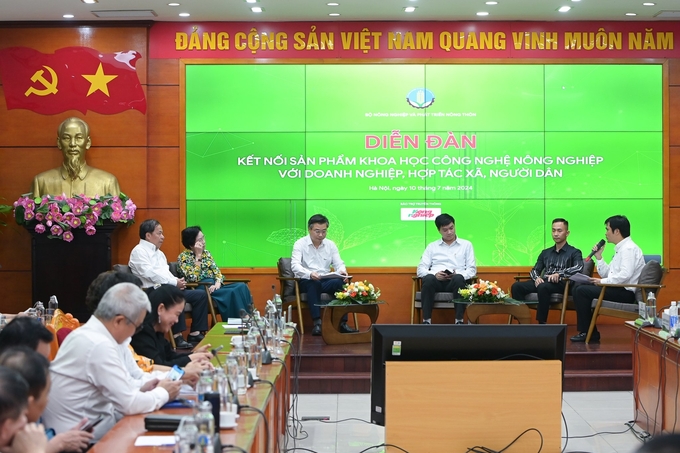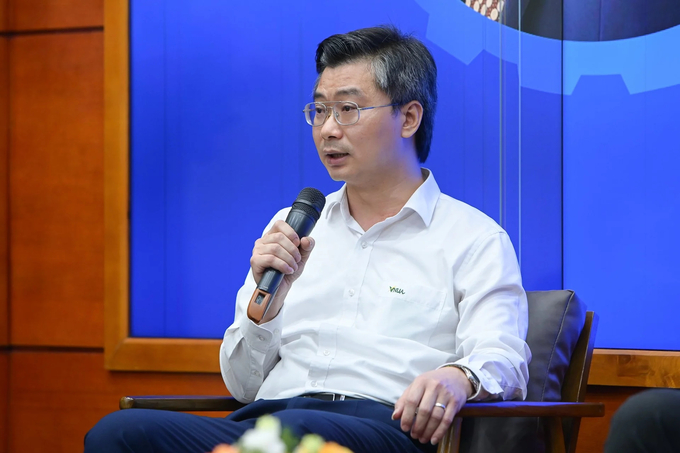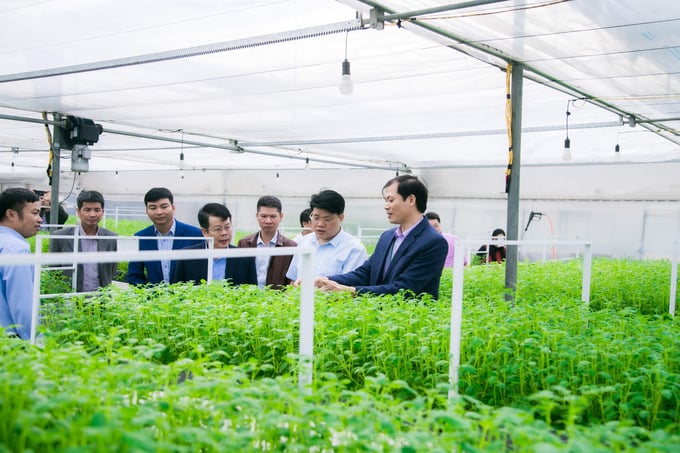May 30, 2025 | 04:51 GMT +7
May 30, 2025 | 04:51 GMT +7
Hotline: 0913.378.918
May 30, 2025 | 04:51 GMT +7
Hotline: 0913.378.918
On July 10, the Ministry of Agriculture and Rural Development organizes a forum to connect agricultural science and technology products with businesses, cooperatives, and the public. Vietnam Agriculture News kindly introduces our readers to insightful conversations in the forum.

Roundtable discussion between researchers and institutions in agriculture. Photo: Tung Dinh.
Dr. Tran Cong Thang, Director of the Institute of Policy and Strategy for Agricultural and Rural Development, highlighted that the State currently supports many national and ministerial-level science and technology programs prioritizing the agricultural sector. He expressed hope that scientists and businesses would collaborate from the initial research idea to the final product, ensuring that once a project concludes, the product can be immediately applied in practice. He posed the question: What can we do to change this approach?
Prof. Dr. Nguyen Hong Son, Director of the Vietnam Academy of Agricultural Sciences, confirmed that this is a long-standing question: How can businesses and scientists work together from the very beginning?
Mr. Son emphasized that the market acts as the "midwife" for scientific research projects. “Without the market, it is impossible to apply these researches to production. Each business has its own goals and orientation, making them practical customers. State funding typically addresses macro-level issues, such as drought, salinity, and climate change. However, businesses are the entities that require tangible resources. In recent years, businesses have been willing to invest in research from their development funds. Therefore, private orders from businesses to researchers and scientists are crucial. Collaboration from the outset is extremely important for success."
Echoing this sentiment, Ms. Tran Kim Lien, Chairwoman of the Board of Directors of Vietnam Seed Group (Vinaseed), analyzed: “Businesses represent the market for science and technology because their goal is to seek profits from the market. Therefore, they best understand market needs. Businesses are aware of both current and future market demands. For example, in the case of corn varieties: colored corn already exists, and the next step will be corn with specific smells or high aconxin content. As Minister Le Minh Hoan stated, there is a need for mechanisms to predict consumer trends and guide scientific research accordingly."
Ms. Lien believes that public-private partnerships are crucial in the current period to maximize social resources and connect research with the market. This would promote the transfer of modern technology into production, thereby restructuring the agricultural sector towards large-scale operations and adapting to global climate change.

Dr. Nguyen Cong Tiep, Deputy Director of the Vietnam University of Agriculture. Photo: Tung Dinh.
Among many strategic policies, science and technology are identified as the most important driving force for developing modern productive forces. Discussion coordinator Dr. Tran Cong Thang posed the question of how to promote the "newness" of research topics, based on emerging needs for green consumption, food safety, and nutrition.
To promote public-private partnership in the field of research, application, and transfer of S&T advances, particularly in the context of limited and unfocused research budgets, Vinaseed proposes amending Decree 70/2018/ND-CP. This amendment should align with the newly revised provisions of the Law on Intellectual Property and create a legal framework for cooperation in research, application, and transfer of scientific and technological advances.
The Chairwoman of Vinaseed's Board of Directors emphasized that the amended laws will facilitate immediate tasks and fundamental research, creating a source of materials with desirable characteristics to support the breeding process.
Expanding this point, Dr. Nguyen Cong Tiep, Deputy Director of the Vietnam University of Agriculture, stated that research linked to actual production is a key factor for the University in promoting partnerships with businesses from the very beginning. "The sustainability of cooperation between businesses and researchers determines the quality of the market," Dr. Tiep affirmed.

The sustainability of cooperation between businesses and researchers determines the quality of the market. Photo: VNUA.
Following the Academy's lead, Mr. Nguyen Duc Hung, Director of Global Food Import-Export Co., Ltd., emphasized the importance of a comprehensive value chain development – from breeding, production, and care, to processing and preservation for export. According to Mr. Hung, ideas to upgrade each of these stages must be grounded in reality and involve transformation steps to enhance product value.
Dr. Hung explained, "This transition will improve the quality of the entire value chain, thereby creating regional value and unique products, fostering a close relationship between science and production."
To achieve synchronized products, technical processes, specific development policies, and output channels need to be carefully planned. Active citizen participation and collaboration with scientists are essential to leverage the knowledge from farmers and businesses.
At the end of the discussion session, the speakers expressed hope that institutes and schools would continue to coordinate closely with businesses to create science and technology products and transfer them into practical production, bringing profits to farmers.
Translated by: Quynh Chi
/2025/05/25/4127-3-073637_820.jpg)
(VAN) Thanks to the promotion from an FAO-implemented project, vegetable production in greenhouses in Moc Chau has seen strong development, from 1.5 hectares in 2021 to nearly 50 hectares in 2024.

(VAN) FAO has recently supported USD 140,000 to implement the project 'Risk mitigation human-animal interface risks through disease control initiatives in pig farming.'

(VAN) The People's Committee of Tra Vinh province has approved an adjustment to the investment policy for the Green Hydrogen Plant project, increasing its area to approximately 52.76 hectares.
![Reducing emissions from rice fields: [2] Farmers’ commitment to the soil](https://t.ex-cdn.com/nongnghiepmoitruong.vn/608w/files/news/2025/05/05/dsc08881jpg-nongnghiep-140632.jpg)
(VAN) Clean rice cultivation model in Thuong Tan commune, Bac Tan Uyen district, is assisting local residents in achieving sustainable agriculture by substantially reducing costs, increasing productivity, and protecting the environment.

(VAN) At the conference to disseminate Resolution No. 68, AgriS introduced its digital agricultural ecosystem and reaffirmed its commitment to accompanying the Government in promoting private sector development and sustainable agriculture.

(VAN) 'Blue Ocean - Blue Foods' initiative is designed to restore marine ecosystems and establish sustainable livelihoods for local communities by cultivating a minimum of 1,000 hectares of cottonii seaweed in the first three years.
/2025/05/21/4642-3-112707_603.jpg)
(VAN) The V-SCOPE project has made direct contributions to three out of six pillars of the Comprehensive Strategic Partnership between Vietnam and Australia.